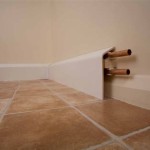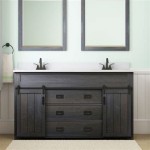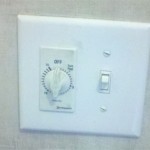Essential Aspects of Bathroom Vanity Sink Styles
When selecting a bathroom vanity sink, several essential aspects should be considered to ensure both form and function are met. Here are some key points to keep in mind:
Shape and Style
The shape and style of the sink can significantly impact the overall aesthetic of the bathroom. Popular shapes include rectangular, oval, round, and square. Each shape has its unique appeal and complements different vanity styles. For example, a rectangular sink complements a modern or contemporary vanity, while an oval sink adds a touch of elegance to a traditional bathroom.
Material and Finish
The material and finish of the sink determine its durability, ease of maintenance, and overall appearance. Common materials include porcelain, ceramic, glass, and stone. Porcelain and ceramic are popular choices for their durability and resistance to stains and scratches. Glass sinks offer a sleek and modern look, while stone sinks provide a natural and earthy feel.
Number of Basins
Vanity sinks come with either one or two basins. Single-basin sinks are space-efficient and well-suited for smaller bathrooms. Double-basin sinks offer more functionality and convenience, allowing multiple users to simultaneously use the vanity. Consider the size of the bathroom and the number of users when deciding on the number of basins.
Mount Type
The mount type determines how the sink is installed on the vanity. There are three main mount types:
- Undermount: The sink is installed below the countertop, creating a seamless and modern appearance.
- Top-mount: The sink is placed on top of the countertop, providing a classic and traditional look.
- Vessel: The sink is installed on top of the countertop but is not surrounded by it, creating a unique and eye-catching focal point.
Size and Depth
The size and depth of the sink are essential for both functionality and aesthetics. Consider the available space on the vanity and the intended usage of the sink. A larger and deeper sink is more suitable for larger bathrooms and can accommodate more water. A smaller and shallower sink is more space-efficient and ideal for smaller bathrooms.
Faucet Compatibility
The sink should be compatible with the desired faucet. Most sinks have pre-drilled holes for faucets, but the number and placement of these holes vary depending on the sink and faucet type. Ensure that the sink has the appropriate number and location of holes to accommodate the chosen faucet.
Additional Features
Some vanity sinks may come with additional features, such as built-in soap dispensers, towel bars, or overflow drains. These features can enhance functionality and convenience in the bathroom. Consider the desired level of functionality and choose a sink with the appropriate features.

Bathroom Vanity Styles To Fit Your Space Forbes Home

Vanities Furniture Style Vs Traditional Cabinet Toulmin Kitchen Bath Custom Cabinets Kitchens And Bathroom Design Remodeling In Tuscaloosa Birmingham Alabama

Pros Cons Bathroom Sink Styles Studio Mcgee

Bathroom Vanity Styles To Fit Your Space Forbes Home

The Ultimate Guide To Bathroom Sinks And Basins R2 Bathrooms

40 Bathroom Vanities You Ll Love For Every Style

How To Decorate A Farmhouse Style Bathroom Vanity Fossil Blu

15 Small Bathroom Vanity Ideas That Rock Style And Storage

New This Week 5 Stylish Single Sink Bathroom Vanity Areas

Bathroom Vanity One Sink Allows More Counter Space Coun Style Custom
Related Posts







